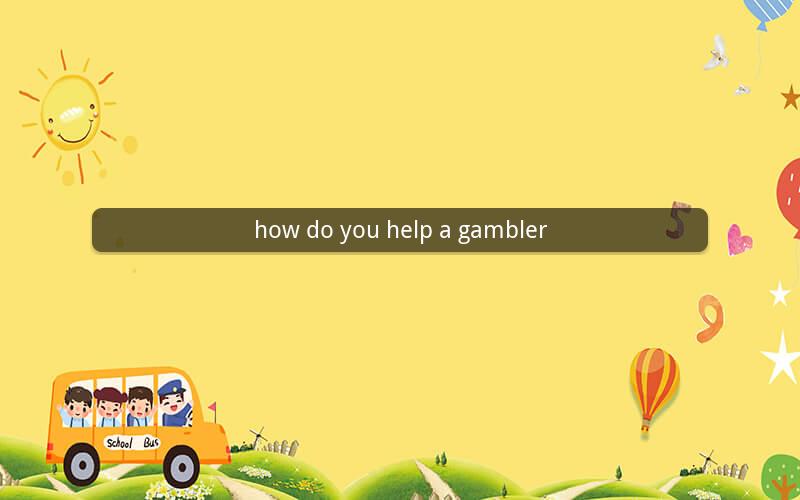
How Do You Help a Gambler?
Table of Contents
1. Understanding the Problem
2. The Importance of Support
3. Encouraging Open Communication
4. Professional Help and Therapy
5. Financial Management
6. Setting Boundaries
7. Support Groups and Community Resources
8. Educating Yourself
9. Patience and Understanding
10. Recognizing the Signs of Relapse
1. Understanding the Problem
To help a gambler, it is crucial to first understand the nature of the problem. Gambling addiction is a complex issue that affects not just the individual but also their family and friends. It is characterized by an inability to control gambling behavior, leading to significant negative consequences in various aspects of life, including financial, emotional, and social.
2. The Importance of Support
Support is a cornerstone in helping a gambler overcome their addiction. It involves providing a safe and non-judgmental environment where the individual can express their feelings and concerns. This support system can include friends, family, and professionals who are committed to helping the gambler through their journey.
3. Encouraging Open Communication
Open communication is essential for understanding the gambler's struggles and providing the necessary support. Encourage the individual to share their thoughts and feelings without fear of judgment. Active listening and empathy can go a long way in fostering trust and a sense of belonging.
4. Professional Help and Therapy
Professional help is often necessary to address the underlying issues contributing to the gambling addiction. Therapy, such as cognitive-behavioral therapy (CBT), can help the individual develop healthier coping mechanisms and address any co-occurring mental health disorders.
5. Financial Management
Gambling addiction often leads to significant financial problems. It is important to help the gambler manage their finances responsibly. This may involve budgeting, seeking financial counseling, and exploring options for debt consolidation or repayment plans.
6. Setting Boundaries
Setting clear boundaries is crucial in protecting the gambler from relapse. This can include limiting access to gambling venues, removing credit cards, and establishing financial and time limits on gambling activities.
7. Support Groups and Community Resources
Support groups, such as Gamblers Anonymous, can provide a sense of community and understanding for individuals struggling with gambling addiction. Community resources, such as counseling centers and hotlines, can also offer valuable support and guidance.
8. Educating Yourself
Educating yourself about gambling addiction can help you better understand the challenges the individual is facing. This knowledge can empower you to offer more informed support and empathy.
9. Patience and Understanding
Recovery from gambling addiction is a long and challenging process. Patience and understanding are key in supporting the individual through their journey. Avoid pressuring them to recover at a pace that is not right for them.
10. Recognizing the Signs of Relapse
Relapse is a common part of the recovery process. Recognizing the signs of relapse, such as increased stress, financial strain, or social isolation, can help you intervene early and provide additional support.
---
10 Questions and Answers
Question 1: What are the signs of a gambling addiction?
Answer: Signs of a gambling addiction include an inability to control gambling behavior, preoccupation with gambling, lying about gambling activities, increased debt, and negative consequences in various aspects of life.
Question 2: How can I help a friend who is struggling with gambling addiction?
Answer: You can help by offering support, encouraging open communication, and suggesting professional help. It is important to be patient and understanding throughout the process.
Question 3: Can therapy help someone with a gambling addiction?
Answer: Yes, therapy, such as cognitive-behavioral therapy (CBT), can be highly effective in helping individuals with gambling addiction develop healthier coping mechanisms and address underlying issues.
Question 4: What role does financial management play in helping a gambler?
Answer: Financial management is crucial in helping a gambler address the financial consequences of their addiction. This may involve budgeting, seeking financial counseling, and exploring options for debt repayment.
Question 5: Are there support groups available for individuals with gambling addiction?
Answer: Yes, support groups such as Gamblers Anonymous provide a sense of community and understanding for individuals struggling with gambling addiction.
Question 6: How can I help a family member who is affected by a loved one's gambling addiction?
Answer: You can help by offering support, learning about the addiction, and seeking professional help for both the gambler and the affected family members.
Question 7: What are the long-term effects of gambling addiction?
Answer: Long-term effects of gambling addiction can include financial ruin, emotional and psychological distress, social isolation, and even legal and criminal consequences.
Question 8: How can I recognize the signs of relapse in a recovering gambler?
Answer: Signs of relapse may include increased stress, financial strain, social isolation, and a return to gambling behaviors. It is important to be vigilant and offer additional support during these times.
Question 9: Can a person recover from a gambling addiction?
Answer: Yes, recovery from a gambling addiction is possible with proper support, treatment, and commitment. It is a long and challenging process, but many individuals have successfully overcome their addiction.
Question 10: What is the most important thing to remember when helping a gambler?
Answer: The most important thing to remember is that recovery is a process, and patience, understanding, and support are key to helping the individual through their journey.